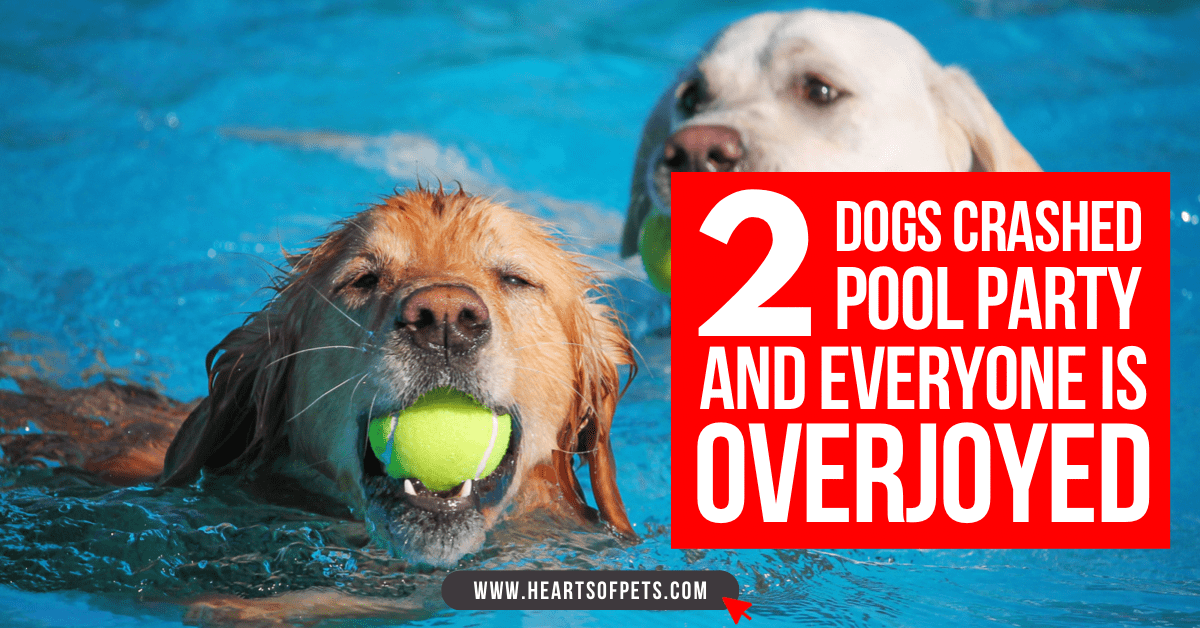Coconut water has become a popular drink for humans in recent years, but have you ever wondered if it’s safe for your furry friend to drink as well? You might be tempted to share some coconut water with your dog on a hot day or use it as a replacement for plain water, but it’s important to know the potential risks and benefits before giving it to your dog.
In this blog, we’ll explore the question, “Can dogs drink coconut water?” and discuss whether or not coconut water is a good choice for your canine companion.
Can Dogs Drink Coconut Water?
Dogs can drink coconut water and coconut products in moderation, but it is not a necessary part of a dog’s diet and should not be given to them as a replacement for plain water. Coconut water is a natural source of beneficial electrolytes and can be a refreshing occasional treat for your dog on a hot walk day. However, it is high in potassium and can cause gastrointestinal upset in dogs if consumed in large amounts.
It is also important to remember that dogs have different nutritional needs than humans and what may be a healthy treat for us may not necessarily benefit them. Therefore, as with any new food or treat, it’s always a good idea to consult your veterinarian before introducing coconut water to your dog’s diet.
What is Coconut Water?
Coconut water is the clear liquid found inside a young, green coconut. It is a natural source of electrolytes, including potassium, sodium, and magnesium, and has a slightly sweet and nutty taste. Coconut water has become a popular sports drink and is often advertised as a safe and healthy drink to sugary beverages. In addition, it is a refreshing beverage and is used in various culinary applications.
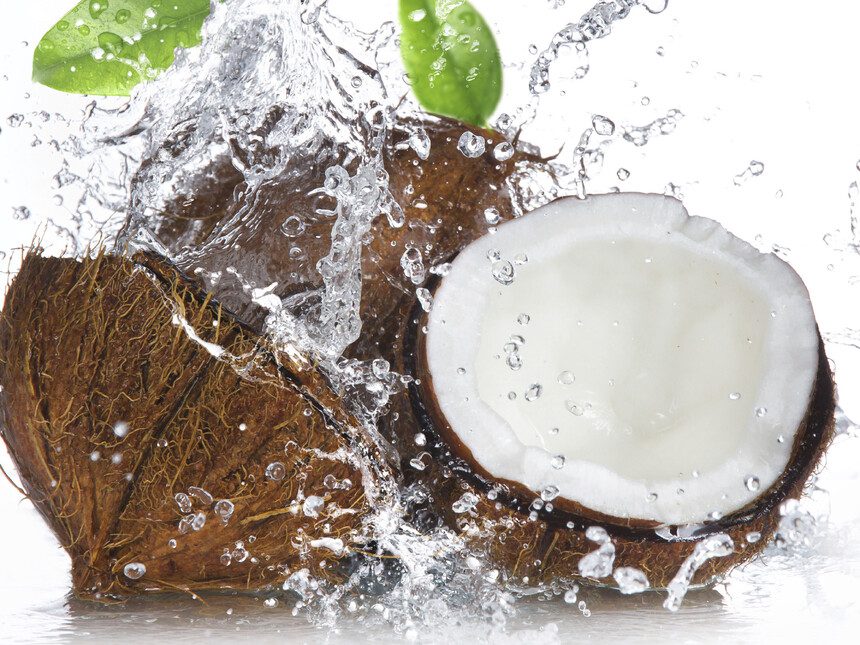
Is Coconut Water Harmful to Dogs?
Can my dog drink coconut water? In general, coconut water is not harmful to dogs to drink in moderation. If your dog was showing mild dehydration symptoms, you can give your dog coconut pulp and water. However, it is not a necessary part of a dog’s diet and should not be given to your dog as a replacement for plain water. Too much coconut water can cause gastrointestinal upset in dogs, such as vomiting or diarrhea. It is also high in potassium, which can be toxic to dogs in large amounts.
As with any new food or treat, it’s always a good idea to consult your veterinarian before introducing coconut water to your dog’s diet. It is also important to remember that dogs have different nutritional needs than humans and what may be a healthy treat for us may not necessarily benefit them.
Coconut Water Versus Coconut Milk for Dogs
Coconut water and coconut milk are often confused, but they are two different products. Coconut water is the clear liquid inside a young, green coconut and is a natural source of electrolytes. On the other hand, coconut milk combines grated coconut meat with water and is used as a base for soups, curries, and other dishes. It is also sometimes used as a plant-based milk alternative for humans.
In general, coconut water is safer for dogs to consume in moderation than coconut milk. Coconut milk contains too much fat and can cause digestive issues in dogs if consumed in large amounts. It is also not a necessary part of a dog’s diet and should not be given to your dog as a replacement for plain water. As with any new food or treat, it’s always a good idea to consult your veterinarian before introducing coconut milk to your dog’s diet.
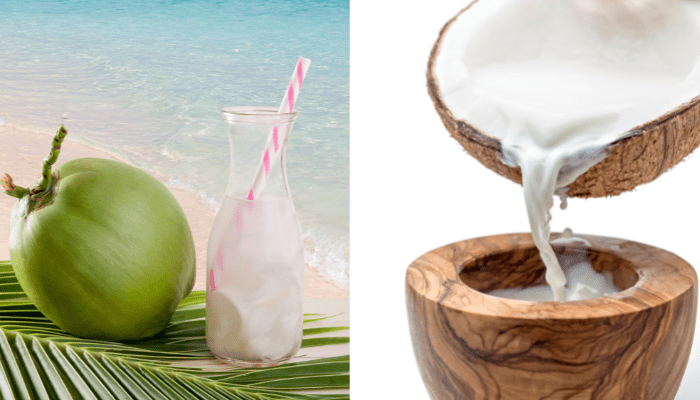
Why Should I Give My Dog Coconut Water?
There is no specific reason why you should give your dog coconut water. It is not a necessary part of a dog’s diet and should not be given to your dog as a replacement for plain water. However, some people may choose to provide their dog with coconut water as a refreshing treat on a hot summer day or as a way to increase their dog’s intake of electrolytes. It’s important to remember that too much coconut water can cause gastrointestinal upset in dogs and is high in potassium, which can be toxic to dogs in large amounts. As with any new food or treat, it’s always a good idea to consult your veterinarian before introducing coconut water to your dog’s diet.
What Are the Health Benefits of Coconut Water for Dogs?
There are no specific health benefits coconut water can have for dogs. It is not a necessary part of a dog’s diet and should not be given to your dog as a replacement for plain water. While coconut water is a natural source of electrolytes and can be a refreshing treat for your dog on a hot summer day, it is not a necessary part of their diet and does not provide any unique health benefits.
It’s important to remember that too much coconut water can cause gastrointestinal upset in dogs and is high in potassium, which can be toxic to dogs in large amounts. As with any new food or treat, it’s always a good idea to consult your veterinarian before introducing coconut water to your dog’s diet.
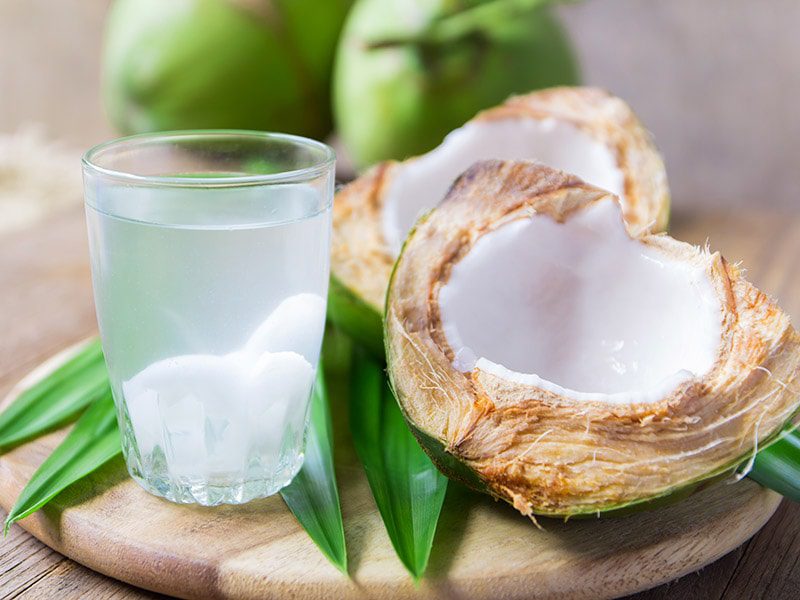
What Are the Risks of Drinking Coconut Water for Dogs?
Hydration Booster
Coconut water contains electrolytes and minerals like potassium, magnesium, sodium, and phosphorus that help keep your pup hydrated. The electrolytes in coconut water are also beneficial for helping replenish fluids lost after strenuous activity or during hot days. A few coconut water ice cubes can also be a great treat during dog training.
In addition, coconut water is much lower in sugar than other sports drinks commonly found on grocery store shelves, so it won’t harm your pup’s teeth while providing the necessary electrolytes.
Digestive System Aid
Coconut water has natural enzymes that can benefit dogs with sensitive stomachs or those prone to digestive issues such as acid reflux or vomiting. In addition, coconut water can soothe an upset stomach or reduce inflammation in the intestines caused by bacteria or infection. It is also known for its probiotic properties, which can help support healthy digestion and gut health.
Healthy Skin & Coat
If you have noticed any dryness or irritation on your pup’s skin, adding coconut water into their diet can help restore moisture levels. Coconut water is great for restoring moisture in the skin and reducing irritation from dryness while promoting overall skin health due to its high levels of antioxidants and nutrients like Vitamin C, which boosts collagen production. This helps promote a shiny coat as well as healthy skin.

Should I Give My Dog Coconut Water Every Day?
No, it is not recommended that you give your pup coconut water every day. Too much of anything can be bad for them! If you want to ensure their daily hydration needs are met, thanks to plain old H2O! Additionally, too much coconut water can lead to gastrointestinal upset, diarrhea, and vomiting in some dogs, so always consult your vet before introducing any new food items into your pet’s diet.
Make sure that whatever type of food or beverage you are giving your pup is tailored towards their size and age group; different types of food may contain ingredients that could be dangerous for smaller animals or puppies – always read the label before feeding anything to your pet.
How Much Coconut Water Should I Give My Dog?
The amount of coconut water you give your dog depends on size, age, and activity level. Generally speaking, small dogs should get no more than two tablespoons per day, while large dogs can have up to 4 tablespoons per day. As with any new food or beverage introduction into your pup’s diet, start slow and gradually increase the amount over time.
How to Give Your Dog Coconut Water?
When giving your pup coconut water for the first time, start by gradually introducing small amounts into their diet; a quarter cup mixed into their regular food or as dog treats are usually enough to get them used to the flavor without overwhelming their stomachs. Then, after they’ve had time to adjust, you can slowly increase their intake to one cup per day depending on their size and activity level (more active pups may need more).
Make sure to track how much they’re drinking coconut water daily so you don’t accidentally give them too much at once! For best results, serve chilled or at room temperature; cold drinks can sometimes upset sensitive stomachs—even those belonging to dogs.
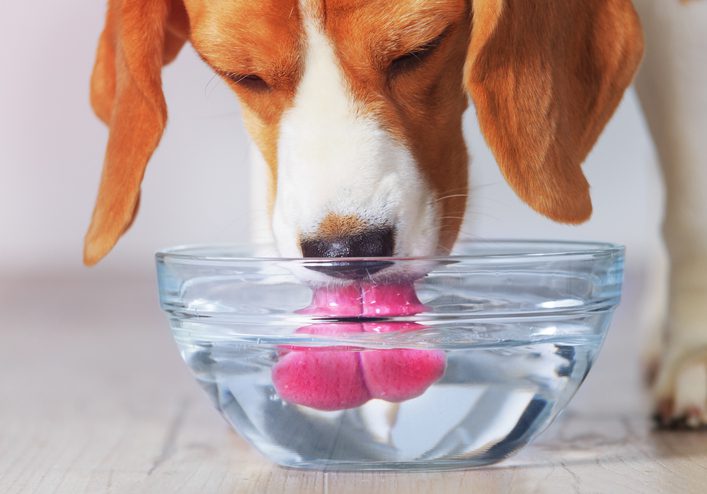
Final Thoughts
In conclusion, can dogs drink coconut water? The answer is yes, but it should only be given in small amounts as a special treat. Coconut water can provide dog’s health benefits to your pup and help keep them hydrated on hot days. However, it’s important to remember that too much can lead to gastrointestinal upset and high in potassium, which can be toxic to dogs in large amounts.
As with any new food or treat, it’s always a good idea to consult your veterinarian before introducing pure coconut water to your dog’s diet. In addition, when feeding your pup whole coconut water, make sure that the type of beverage is tailored towards their size and age group, as different types of food may contain ingredients that could be dangerous. Finally, always offer plenty of fresh water and natural coconut water.
Frequently Asked Questions
How much can coconut water my dog drink?
Provide your pup with an extra hydration boost by adding a couple of tablespoons to their diet daily, feeling more creative. Consider treating them to refreshingly cold young coconuts instead—it'll make for the perfect reward come training time! Just be mindful that you avoid high carbohydrate content and potential sugar-related complications.
What kind of coconut water can dogs drink?
Not only is cocoa water safe for our furry friends, but it's also full of nutrients. It has potassium to help them stay energized and contains essential vitamins and minerals to ensure proper nutrition.
Is coconut poisonous to dogs?
While coconut-based treats may seem like the perfect indulgence for your furry friend, dog owners should be aware of potential dangers. Coconut milk has oils that can cause digestive issues in animals, and coconut water is now off-limits due to its high potassium levels, posing severe risks if ingested.
What can dogs drink besides water?
Does your canine friend need an electrolyte boost? Make it easy for them to stay hydrated by providing a tasty Pedialyte beverage! With the right balance of water and minerals, you can provide all the fluids they need without overdoing it.

